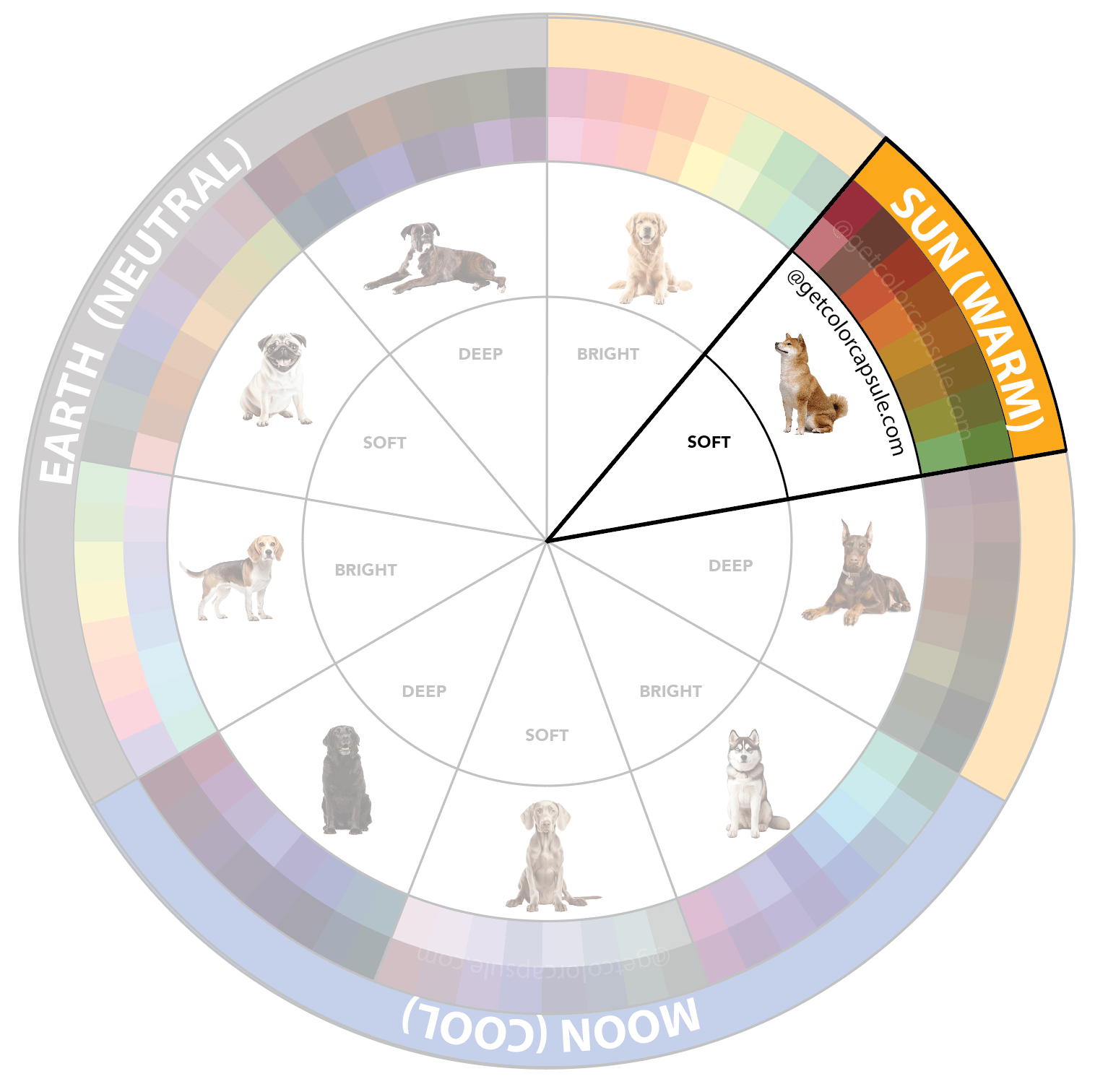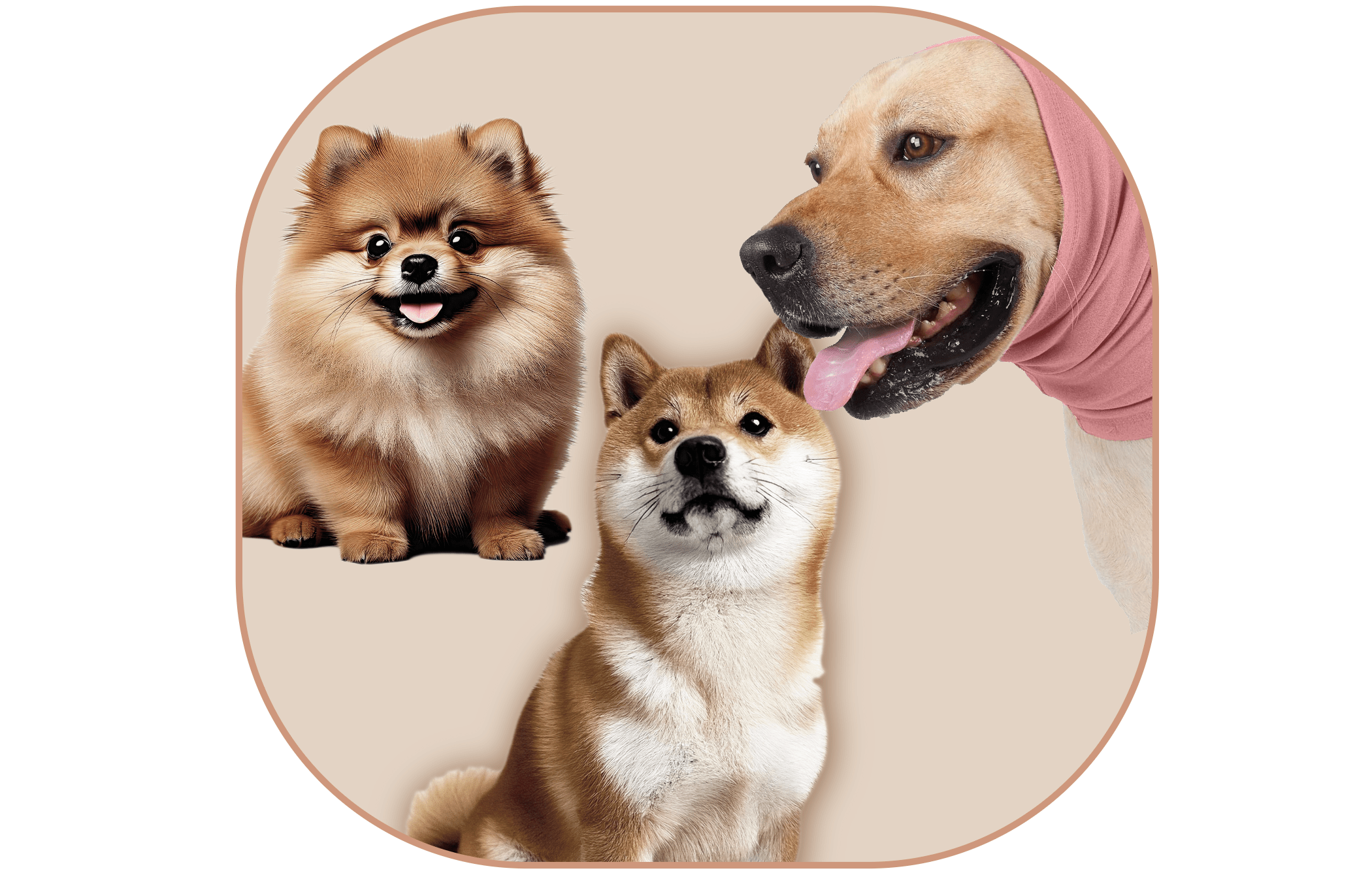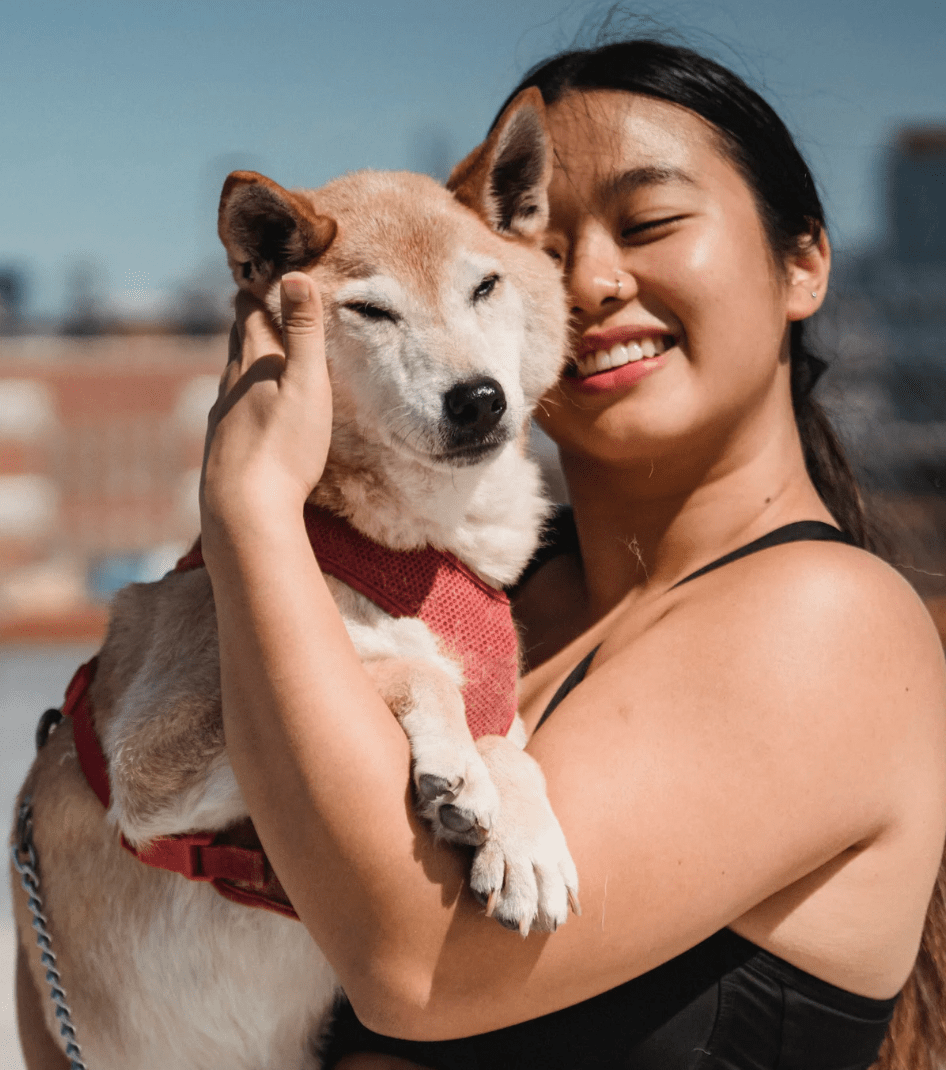The Soft Sun Dog Color Type: A Comprehensive Guide
The Soft Sun category stands out for its gentle, understated radiance. These dogs exhibit muted warm tones, such as soft reds, oranges, or apricots, that exude a cozy and welcoming warmth without overwhelming vibrancy.

Characteristics of Soft Warm Dogs
The Soft Sun type is part of the Sun (Warm) group in the Dog Color Element system.
Dogs in this category don’t have the bright, vibrant tones of the Bright Sun subcategory, nor the intense, dark tones of Deep Sun. Instead, they represent a middle ground of softness and warmth, evoking the gentle glow of a fading sunset or embers in a dying fire.
These dogs are characterized by:
Hue: Muted warm tones. The coat leans distinctly warm, with orange, red, or tan undertones. However, these tones are muted rather than bold or striking.
Chroma: Low to medium saturation, giving their coat a soft, understated appearance. Soft Sun dogs usually have a low to moderate contrast between their coat color and any white or cream markings.
Value: Medium to medium-light tones, making the overall color feel warm yet diffused.
Examples of Coat Colors:
- Muted orange-red
- Dusty peach or apricot
- Light, warm tan
Example Breeds:
- Shiba Inu: Some Shiba Inus with softer, less vibrant red coats fit this category.
- Golden Retriever (Light Coats): Muted golden tones in some Golden Retrievers can align with the Soft Warm profile
- Chow Chow (Cinnamon Coats): Dogs with muted reddish-tan coats can also belong here

Note that not all of these dog types fall into the Soft Sun category. Depending on the vibrancy of their fur, many of them also fall within the Bright Sun category. If you are unsure into which category your dog falls, you can book a personalized analysis here.
The Palette: Colors That Complement Soft Sun Dogs
Soft Warm dogs shine when paired with colors that harmonize with their gentle warmth and muted tones. Here’s how to choose the perfect colors:

Warm, Muted Shades
Colors like apricot, peach, dusty rose, terracotta, and caramel complement the soft warmth of their coat. These hues enhance their natural glow without being overpowering.
Earthy Accents
Tones such as olive green, soft sage, and muted gold provide a grounded balance. These colors add depth while keeping harmony with their coat’s warmth.
Neutrals
Cream, taupe, and beige create subtle harmony, perfectly matching the muted and understated tones of Soft Warm dogs.
Colors to Avoid
Bright and cool colors: Vibrant blues, purples, or icy grays can clash with the warm undertones of their coat, making their natural coloring look dull or out of place.
Bold or neon colors: These colors overwhelm their subtle softness, drawing attention away from their gentle beauty.
Styling Tips for Soft Warm Dogs
If you want to accessorize your dog or choose complementary colors for their surroundings, here are some tips:
- Leashes and Collars: Opt for leather tones (camel or chestnut) or muted warm fabrics like apricot or sage.
-
Seasonal Adaptations: In summer, lightweight materials in warm pastel tones can help keep them cool while enhancing their palette. In winter, cozy knits in muted golds or taupes add warmth and style.
-
Layering Accessories: Scarves or bandanas in complementary shades can elevate their look. Layering textures like corduroy and brushed wool enhances their appearance.
-
Photographic Harmony: When taking photos of Soft Sun dogs, consider backdrops in warm, muted hues to complement their fur and create a cohesive visual aesthetic.
By understanding the unique needs of Soft Sun dogs and recognizing the distinctions from human color analysis, you can curate a wardrobe and aesthetic that highlights their natural beauty while ensuring practicality and comfort.
Patterns That Flatter Soft Sun Dogs
Patterns featuring low contrast and soft, muted colors are ideal, as they align with the natural tones of their coats.
Opt for flowing, organic shapes like florals or watercolor designs that enhance their harmonious appearance without overwhelming their soft palette. Avoid bold, high-contrast patterns or rigid geometric shapes, as these can overpower the dog’s natural softness and create visual discord.
For instance, heart motifs in muted tones or tonal polka dots can subtly complement their fur.

On the other hand, patterns with overly bright or stark colors, such as vibrant blues or intense reds, clash with their muted aesthetic and should be avoided. Always aim for a balance that enhances their natural charm.
Metals That Complement Soft Sun Dogs
Warm metals like gold, rose gold, bronze, and copper harmonize with the Soft Sun’s soft, golden hues, creating a cohesive and polished appearance. These metals are ideal for collars, tags, and other accessories, blending seamlessly with their natural tones without creating harsh contrasts.

Cool metallics, such as silver or chrome, may feel too stark and clash with the dog’s warm coloring. When choosing metallic accents, consider textures and finishes as well—brushed or matte metals often work better than overly shiny or reflective finishes, which can distract from their subtle beauty. By selecting the right metals, you can create a balanced and elegant look for your Soft Sun dog.

For instance, heart motifs in muted tones or tonal polka dots can subtly complement their fur. On the other hand, patterns with overly bright or stark colors, such as vibrant blues or intense reds, clash with their muted aesthetic and should be avoided. Always aim for a balance that enhances their natural charm.
How Dog Color Analysis Differs from Human 12 Color Season Analysis
When applying the principles of color analysis to dogs, there are notable differences compared to human 12-color season analysis. While humans are analyzed based on their skin undertone, eye color, and hair shade, dogs rely more heavily on their fur tones, coat patterns, and even their nose and paw pad coloration. Here’s how the analysis diverges:
Color Distribution: In dogs, the distribution of warm and cool tones across their fur can vary widely. For example, a Soft Sun dog may exhibit a mix of warm golden tones and muted cool grays, requiring careful consideration of balance when selecting colors for outfits or accessories.
High-Contrast vs. Low-Contrast Coats: Dogs naturally exhibit different contrast levels in their coats, which can influence their ideal color palette. A dog with a Soft Sun palette may look best in low-contrast patterns or colors that reflect the subtle interplay of their fur tones, rather than high-contrast combinations that might overwhelm their appearance.
Material and Texture: For dogs, material and texture play an important role in color analysis. A shiny finish might clash with a dog’s soft, matte coat, while brushed or quilted fabrics enhance their natural softness and complement their muted tones.
Functionality in Color Selection: Unlike humans, practicality must be factored into a dog’s color palette. For example, the color of a coat or accessory must not only enhance their appearance but also be durable and easy to clean.
Why Celebrate the Soft Warm Color Type?
Dogs with the Soft Warm color type possess a unique, understated elegance. While their colors may not be as striking as the Bright Warm or as intense as the Deep Warm, their muted glow brings a sense of warmth, calm, and elegance that’s truly special.
Recognizing and complementing their coat colors not only enhances their natural beauty but also strengthens the bond between you and your furry friend.
Conclusion
Soft Warm dogs are a beautiful blend of warmth and subtlety, with muted tones that create a soft, welcoming appearance. By understanding their unique coloring and choosing the right colors to complement them, you can highlight their natural charm and create a cohesive look that reflects their personality.
Does your dog belong to the Soft Warm type? Share their photos and stories—let’s celebrate their gentle, glowing warmth! 😊
Soft Sun Color & Styling Guide


